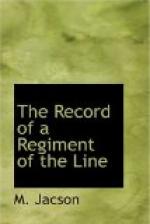Judging from the above, the native must have then run away and not have waited to see the finish, for in the evening the following news came in:—
“Buller attacked Spion Kop, seized and occupied it, but was driven off again the next night. Our loss is estimated at 200 killed and 300 wounded.”
With the knowledge that history has given the world about the battle of Spion Kop, further comment is needless. The news above is given as it was received by the garrison of Ladysmith, who of course knew nothing but what was sent in in scraps by Sir Redvers Buller, and what came in to the Intelligence Department by native runners.
On the 30th the daily ration was further cut down to 1/2 lb. of meat, 2 biscuits, 1/6 oz. of tea, and 1/2 oz. of sugar per man. Horses, except those belonging to the artillery, went rationless.
On January 31st horse-flesh was issued for the first time as a ration.
One dozen whisky was raffled in the town, and fetched L144—L1 10s. per wineglass!
The only news received from the outside world on February 2nd was that—
“Sir R. Buller has retired behind the Tugela to rearrange, and Sir John Lubbock has been made a peer.”
The question asked is, Who is Lubbock, and is he connected in any way with the evacuation of Spion Kop?
Some say that the news is the wrong way about, and that Lubbock has retired and Sir R. Buller been made a peer. Confirmation of the news was anxiously awaited.
Whichever way it was, in the face of the evacuation of Spion Kop it was poor news to feed a half-starved and anxious garrison on. However, in the meantime the big gun on Bulwana had fired his great shells into the Railway Cutting Camp and killed the doctor’s horse.
About this time a decoction called “chevril” was issued to the men. It was supplied by the 18th Hussars’ horses, whose bodies were boiled down for the purpose. It was nourishing and the men liked it, which was a good thing. There was nothing else by which to recommend it. The men were also allowed to go down to the chevril factory, which was close to the station, and buy the flesh of the horse after it had passed through the boiling process. This did not appear appetizing, but again the men liked it, and when cooked up with wild spinach which grew about the lines it was considered very tasty.
Two items of news were received on February 4th, one being that General Buller had again crossed the Tugela in three places and was to be expected shortly, and the other that the garrison of Ladysmith was to be attacked again next morning by 10,000 Boers. Arrangements were made to meet the latter, the arrival of the former being considered hypothetical. The garrison stood to arms at three o’clock the following morning and anxiously awaited the dawn, but everything went off quietly, and at 5.30 a.m. General Buller’s guns commenced in three different directions. The sound of the heavy gun fire increased in intensity, till at 2.30 p.m. the noise could be compared to a heavy storm with incessant thunder.




